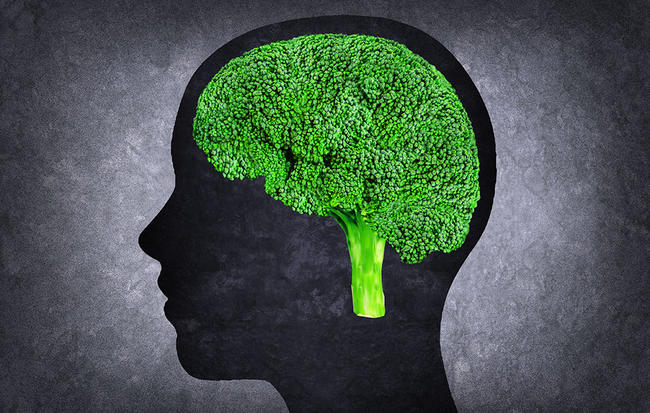From forgetting where you put your keys to witnessing a family member suffer from dementia, everyone has brushes with memory failure to varying degrees. While forgetting a name or wandering around a parking lot for a little too long isn’t something to be concerned about, you can take steps to protect your memory. The biggest preventive measure is memory-boosting diet.
“My absentminded clients are thrilled when they learn that there are nutritional and lifestyle strategies that may keep them from sliding down the slippery slope of memory loss,” says Joy Bauer, Ms, RD, CDN, author of Joy Bauer’s Food Cures. She’s shared with us foods that are double, triple, even quadruple whammy’s against fading memory. “Every single suggestion listed here will also help improve overall health, so it’s win-win, with no downside. Better memory and better health.”

Cabbage
“Cabbage head” might not be the insult you think it is, because cabbage is a good source of folic acid. “The closest thing we have to a magic bullet for fixing memory problems is folic acid (also known as folate),” says Bauer. “This nutrient may just be the single best way to lower blood levels of homocysteine, which is thought to damage blood vessels.” She explains a study from Tufts University that linked homcysteine to memory decline, but also suggested that folic acid served as a buffer.

Eggs
Eggs get celebrated for having so much protein that we forget that they’re rich in other nutrients, like vitamins B6 and B12. Bauer says that in the same Tufts University study that found folic acid protective of the brain, the researcher found that B vitamins seemed to play a role, as well.
“This same study also showed that men who were deficient in vitamins B6 and B12 showed a more rapid decline of memory than those who had adequate blood levels of those vitamins,” she explains.

Broccoli and Broccoli Rabe
A Harvard study of 13,000 women suggests these cruciferous veggies can protect your memory. “The participants who ate relatively high amounts of vegetables over the years had less age-related decline in memory,” she says. “Cruciferous vegetables and leafy green vegetables (including spinach and mustard greens) had the biggest effect on helping women retain their memory during the course of the study.” Not only are broccoli and broccoli rabe cruciferous veggies, but they’re also high in the antioxidant quercetin, folic acid, and vitamin B6.

Strawberries
“The color of fruits and vegetables—red apples, purple blackberries, green broccoli—is caused by natural compounds called phytochemicals. There are thousands of phytochemicals in the world, and each fruit or vegetable can contain more than a hundred of them,” says Bauer.
“Many phytochemicals are antioxidants, which nourish and defend body cells—including neurons—against damage called oxidative stress, caused during oxygen metabolism. Antioxidants also help prevent the buildup of plaque in the arteries, so there is good, strong blood flow to the brain.”
Strawberries are an excellent source of anthocyanin, an antioxidant that has been shown to reverse memory loss in animal studies. Strawberries are also high in folic acid and vitamin B6.

Red Wine
Obviously, too much red wine has negative consequences for your memory (both immediately and long-term), but in moderation, red wine and it’s antioxidant, quercetin, can actually help protect your memory.
Bonus: Red wine also contains the antioxidant anthocyanin, so it’s doing double duty. “The phytochemicals anthocyanin and quercetin actually reversed some of the age-related memory deficits in laboratory rats,” says Bauer. “Although it isn’t possible to test the effects of nutrients with such specificity in people, it is possible that these same foods could work to reverse our own memory loss.”

Coffee and Tea
“Any coffee lover can tell you they think more clearly after a good, strong cup of caffeinated coffee. Now, they have proof,” says Bauer. She explains that researchers from the University of Innsbruck in Austria found that caffeine improved performance on a memory task.
If you’re not a fan of coffee, tea also has cafefine, plus the antioxidant quercetin for an extra memory boost.

Salmon
“There are good fats and bad fats, and omega-3 fatty acids fall solidly on the side of good,” says Bauer. That makes salmon a great ally in your fight to protect your mind (it’s one of the best and healthiest fish on the planet).
It’s said fish is brain food, and now science has confirmed it. Bauer describes a Rush University Medical Center study, saying “People who ate fish at least once a week had a 10 percent slower decline compared with those who did not eat fish, a difference that gave them the memory and thinking ability of a person three years younger.” Bonus: Salmon is also rich in vitamins B6 and B12.












